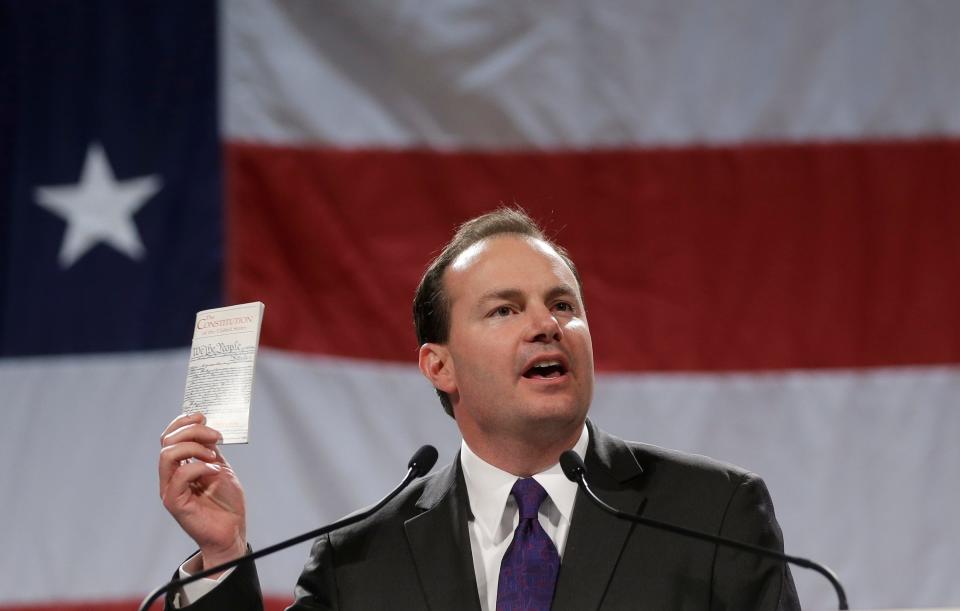Justice Department must heed senator's call to see if TVA is limiting broadband buildout
- Oops!Something went wrong.Please try again later.
The Tennessee Valley Authority (TVA), which distributes electricity to 153 utilities across seven states, finds itself in the crosshairs of Sen. Mike Lee, R-Utah, a member of the U.S. Senate Judiciary Committee and the ranking member of the Senate Judiciary Subcommittee on Competition Policy, Antitrust, and Consumer Rights.
In a June 22 letter to the U.S. Department of Justice, Senator Lee wrote that the TVA is trying to supersede state laws and its policies are harming efforts to close the digital divide.

Senator Lee’s letter to DOJ’s Antitrust Division expresses concerns that the TVA has assumed the role of regulator for pole attachment access charges for the local power companies that purchase power from the authority. Lee argued that the TVA is “displacing state regulators that would otherwise exercise jurisdiction.”
With tens of billions of dollars in taxpayer money now being distributed across the country for the purposes of extending broadband infrastructure, including $42.45 billion from the Broadband Equity, Access, and Deployment (BEAD) program, it is important that the funds go to truly unserved areas first followed by underserved areas. Senator Lee argued that policies of the TVA local power companies could run counter to that goal.
Editor's note: The president of the Tennessee Valley Public Power Association wrote to the U.S. Justice Department on Oct. 26 contesting many of Senator Lee's claims. You may read the letter at this link.
Delays in pole agreements could delay obtaining government permits
The concerns Lee addresses in the letter will sound familiar to those who have read the Taxpayers Protection Alliance’s (TPA) reports on government-owned broadband networks. In situations where governments start their own taxpayer- or ratepayer-funded networks, they are incentivized to enact other policies that harm the free market.
Lee said he has heard “troubling reports” that some local power companies regulated by the TVA are holding up broadband deployment by private internet service providers (ISPs) by delaying or refusing to negotiate pole attachment agreements, especially in those areas where the utility provides its own broadband service or is considering doing so.
Most utility poles in the rural south are owned by local power companies, but space is leased on poles for providers of other services, such as cable and broadband, because it is much cheaper than building duplicative infrastructure.
Lee pointed out that delays in pole attachment agreements could prevent ISPs from obtaining government permits in sufficient time to meet deadlines for the federal grants. He also noted that even in cases in which the ISP is willing to pay for a contractor to process pole attachment applications in a timely manner (a standard industry practice), some of the TVA’s local power companies are reportedly refusing to do so.
“These practices not only frustrate federal broadband deployment policies, they raise serious competition questions regarding prohibited anticompetitive conduct,” Lee wrote.
Is TVA encouraging anti-competitive behavior? DOJ should investigate
The Utah senator said that the TVA should use its authority over distribution contracts to require local power companies to offer “reasonable, non-discriminatory, and prompt pole access to third-party broadband providers (particularly recipients of taxpayer-funded broadband grants) in unserved areas.”
Lee noted that he and Kanter had previously spoken on the importance of pole attachments in delivering broadband across the U.S. He asked the DOJ to review these potential anti-competitive practices.
“It is … important to ensure that pole owners, such as electric distributors, not leverage their position or manipulate regulatory schemes to impede broadband deployment by competitors or extract unreasonable prices. Such anticompetitive behavior frustrates successful execution of federal programs, denies subscribers the benefits of free and fair competition, and hurts unserved Americans by delaying their access to the economic, health care, and education benefits of high-speed connectivity,” Lee wrote.
The DOJ should heed these concerns and investigate whether the TVA is encouraging anti-competitive behavior. With so much taxpayer money at stake, it is essential that the broadband funds are spent efficiently so that more Americans are connected.
Johnny Kampis is director of telecom policy for the Taxpayers Protection Alliance.
This article originally appeared on Nashville Tennessean: Broadband: DOJ must heed concerns about Tennessee Valley Authority

